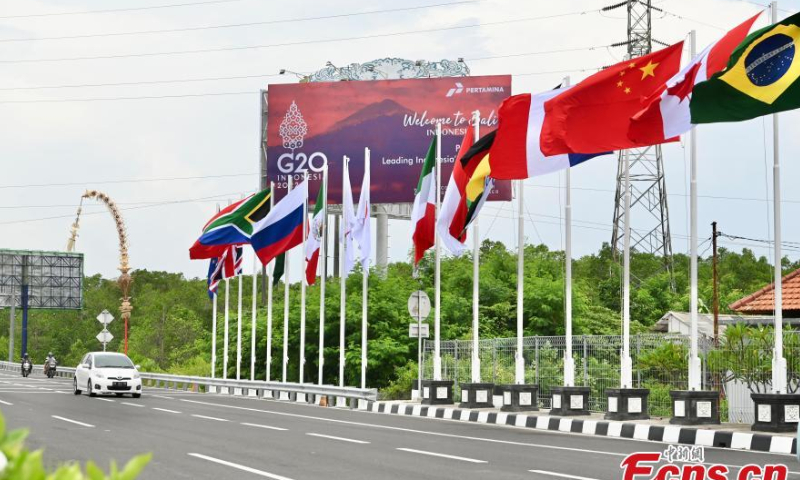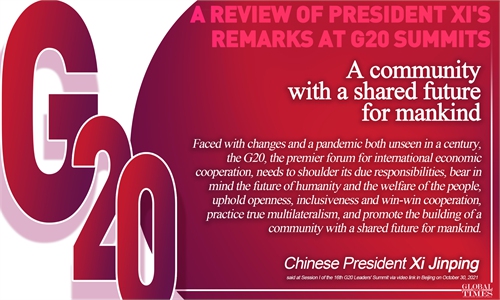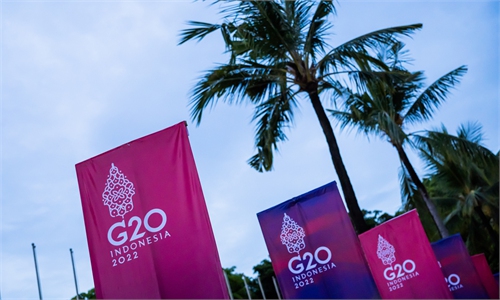
The flags of G20 member nations and posters are hung ahead of the G20 Summit in Bali, Indonesia, Nov. 13, 2022. Photo: China News Service
As this year's G20 Leaders' Summit, which is described by some to be the most difficult one, is set to kick off in the Indonesian resort island of Bali on Tuesday, the host country is striving to keep the focus of the crucial meeting on economic issues rather than geopolitical tensions, with the Indonesian President Joko Widodo warning against rivalry, while locals, including G20 volunteers, are calling for cooperation.
Amid geopolitical tensions, especially between the West and Russia, concerns are growing over the prospect of any concrete outcomes from the summit and some world leaders and experts are warning of dire consequences for the global economy and calling for world leaders to focus on tackling economic crises.
China, as the world's second-largest economy and a staunch advocate of multilateralism and free trade, could contribute greatly to not only shaping discussions around economic challenges but leading the global recovery from the COVID-19 pandemic, experts said.
Focus on economy
The theme of the Indonesia presidency for the G20 summit is straightforward. The slogan "Recover Together, Recover Stronger" can be seen everywhere in Bali, from the airport to highways to the various venues of the G20 summit.
However, equally obvious is the tension and uncertainty building up ahead of the summit, with various Western countries making it clear that they will focus on the Russia-Ukraine conflict at the summit.
Apparently aware of the tensions, Widodo told US President Joe Biden at a bilateral meeting in Bali on Monday that Indonesia hopes "the G20 summit can deliver concrete partnerships that can help the world in its economic recovery," according to Reuters.
The Indonesian President was more direct in advocating cooperation over tension at another public speech ahead of the G20 Summit. At a forum in Bali on Sunday, Widodo warned that "the world cannot be developed with rivalry and greed," and instead must be built on tolerance and cooperation that is mutually respectful and beneficial, according to local media outlet Tempo.com on Monday.
That appeal for cooperation is also reflected in the Indonesian society, as many locals, including G20 volunteers, are calling for cooperation instead of arguments.
Asked about whether she expects argument among world leaders over geopolitical issues or focus on economic issues, Helly Chatalina Amarita, a technical staff at the G20 media center, was very direct.
"No, no arguing, but to make us all [in] Indonesia and all the world feel comfortable … For the next step after the pandemic," Amarita told the Global Times on Monday at the G20 media center, where many local and foreign journalists have gathered.
Some locals also praised their government's efforts to balance different views at the G20 summit.
"I think everybody knows there are contrasting forces at the G20. However, I believe that the Indonesian government has played a really great role in balancing out these forces and being on neutral ground by stepping off pressure from both sides," Jemima Shalimar Al Mubaroq, a local Indonesian reporter, told the Global Times on Monday.
Asked what she expects from the G20 summit, she said, "honestly, I expect them to focus more on economic issues, especially humanitarian help for the Ukrainian crisis and others, instead of bickering among themselves."
The 2022 G20 summit comes as the world is possibly heading toward a global recession. As central banks across the world have simultaneously hiked interest rates in response to inflation, the world may be edging toward a global recession in 2023 and a string of financial crises in emerging markets and developing economies that would do them lasting harm, according to a comprehensive new study by the World Bank.
"Under the current global crisis, whether in developing or developed countries, or in multilateral institutions, seeking for recovery and development is in the interest of all. If such an agenda overshadowed by geopolitical confrontation at the G20 summit, global governance will inevitably be harmed," Xu Liping, director of the Center for Southeast Asian Studies at the Chinese Academy of Social Sciences, told the Global Times on Monday.
"All parties should put aside divisions, build consensus, and find a global solution to reach a positive consensus against this background," Xu said.
While tensions are rising, some global leaders have warned against serious risks for the global economy.
At a forum of the B20, which is also held in Bali ahead of the G20 Leaders' Summit, Jeffrey Sachs, president of the United Nations Sustainable Development Solutions Network, warned that trade protectionism is worse than 10 years ago and increasing protectionism, especially in the US and some other countries, is "a huge mistake and a huge danger," according to local Indonesian news outlet Jakarta Globe.
Under America First agenda, the US has been imposing sanctions on many countries, launching a trade war and technologic blockade against China and constantly putting its own geopolitical ambition over global economic issues. In addition, US' aggressive monetary tightening has also caused havoc around the world.
The US' intention of participating in this gathering was to show off its hegemony, and better if it can create confrontation and isolation, Xu said.
In stark contrast, China has been constantly opening up its market to global businesses and firmly safeguarding multilateral cooperation like the G20 and global free trade, which is more welcome in many countries around the world that want to focus on economic cooperation over geopolitical conflict, analysts said.
"To support the host country to push forward summit agenda, and successfully organize the event, is in China's top priority," Xu said, noting that China has been playing its constructive role in the global events like G20 by offering its solutions to global challenges.
For instance, as food security is now a concern of all countries, leaders from across government, industry and civil society will discuss how to secure supply chains and fight world hunger on the sidelines of the G20 summit - where China can offer its experience and solutions.
As the largest developing country in the world, China manages to feed nearly 20 percent of the world's population with less than 9 percent of the world's arable land, and has become the largest food producer and the third largest food exporter in the world.
Moreover, from 1979, hybrid rice began to be introduced to the world, benefitting nearly 70 countries across five continents. This has been a remarkable contribution to their grain output increase and agricultural development, and offered a Chinese solution to food shortages in developing countries.
Xu said China will this time share its digital transformation experience on the sidelines of the summit, which will be of great significance to developing economies like Indonesia and others.
Last year, ministers from G20 already established a digital economy working group, a forum that will help guide the world through upcoming digital transitions.
"It's the time when global society need more cooperation and development and fight for protectionism - that's also what China has always been fighting for," Xu said.
Amid geopolitical tensions, especially between the West and Russia, concerns are growing over the prospect of any concrete outcomes from the summit and some world leaders and experts are warning of dire consequences for the global economy and calling for world leaders to focus on tackling economic crises.
China, as the world's second-largest economy and a staunch advocate of multilateralism and free trade, could contribute greatly to not only shaping discussions around economic challenges but leading the global recovery from the COVID-19 pandemic, experts said.
Focus on economy
The theme of the Indonesia presidency for the G20 summit is straightforward. The slogan "Recover Together, Recover Stronger" can be seen everywhere in Bali, from the airport to highways to the various venues of the G20 summit.
However, equally obvious is the tension and uncertainty building up ahead of the summit, with various Western countries making it clear that they will focus on the Russia-Ukraine conflict at the summit.
Apparently aware of the tensions, Widodo told US President Joe Biden at a bilateral meeting in Bali on Monday that Indonesia hopes "the G20 summit can deliver concrete partnerships that can help the world in its economic recovery," according to Reuters.
The Indonesian President was more direct in advocating cooperation over tension at another public speech ahead of the G20 Summit. At a forum in Bali on Sunday, Widodo warned that "the world cannot be developed with rivalry and greed," and instead must be built on tolerance and cooperation that is mutually respectful and beneficial, according to local media outlet Tempo.com on Monday.
That appeal for cooperation is also reflected in the Indonesian society, as many locals, including G20 volunteers, are calling for cooperation instead of arguments.
Asked about whether she expects argument among world leaders over geopolitical issues or focus on economic issues, Helly Chatalina Amarita, a technical staff at the G20 media center, was very direct.
"No, no arguing, but to make us all [in] Indonesia and all the world feel comfortable … For the next step after the pandemic," Amarita told the Global Times on Monday at the G20 media center, where many local and foreign journalists have gathered.
Some locals also praised their government's efforts to balance different views at the G20 summit.
"I think everybody knows there are contrasting forces at the G20. However, I believe that the Indonesian government has played a really great role in balancing out these forces and being on neutral ground by stepping off pressure from both sides," Jemima Shalimar Al Mubaroq, a local Indonesian reporter, told the Global Times on Monday.
Asked what she expects from the G20 summit, she said, "honestly, I expect them to focus more on economic issues, especially humanitarian help for the Ukrainian crisis and others, instead of bickering among themselves."
The 2022 G20 summit comes as the world is possibly heading toward a global recession. As central banks across the world have simultaneously hiked interest rates in response to inflation, the world may be edging toward a global recession in 2023 and a string of financial crises in emerging markets and developing economies that would do them lasting harm, according to a comprehensive new study by the World Bank.
"Under the current global crisis, whether in developing or developed countries, or in multilateral institutions, seeking for recovery and development is in the interest of all. If such an agenda overshadowed by geopolitical confrontation at the G20 summit, global governance will inevitably be harmed," Xu Liping, director of the Center for Southeast Asian Studies at the Chinese Academy of Social Sciences, told the Global Times on Monday.
"All parties should put aside divisions, build consensus, and find a global solution to reach a positive consensus against this background," Xu said.
While tensions are rising, some global leaders have warned against serious risks for the global economy.
At a forum of the B20, which is also held in Bali ahead of the G20 Leaders' Summit, Jeffrey Sachs, president of the United Nations Sustainable Development Solutions Network, warned that trade protectionism is worse than 10 years ago and increasing protectionism, especially in the US and some other countries, is "a huge mistake and a huge danger," according to local Indonesian news outlet Jakarta Globe.
Under America First agenda, the US has been imposing sanctions on many countries, launching a trade war and technologic blockade against China and constantly putting its own geopolitical ambition over global economic issues. In addition, US' aggressive monetary tightening has also caused havoc around the world.
The US' intention of participating in this gathering was to show off its hegemony, and better if it can create confrontation and isolation, Xu said.
In stark contrast, China has been constantly opening up its market to global businesses and firmly safeguarding multilateral cooperation like the G20 and global free trade, which is more welcome in many countries around the world that want to focus on economic cooperation over geopolitical conflict, analysts said.
"To support the host country to push forward summit agenda, and successfully organize the event, is in China's top priority," Xu said, noting that China has been playing its constructive role in the global events like G20 by offering its solutions to global challenges.
For instance, as food security is now a concern of all countries, leaders from across government, industry and civil society will discuss how to secure supply chains and fight world hunger on the sidelines of the G20 summit - where China can offer its experience and solutions.
As the largest developing country in the world, China manages to feed nearly 20 percent of the world's population with less than 9 percent of the world's arable land, and has become the largest food producer and the third largest food exporter in the world.
Moreover, from 1979, hybrid rice began to be introduced to the world, benefitting nearly 70 countries across five continents. This has been a remarkable contribution to their grain output increase and agricultural development, and offered a Chinese solution to food shortages in developing countries.
Xu said China will this time share its digital transformation experience on the sidelines of the summit, which will be of great significance to developing economies like Indonesia and others.
Last year, ministers from G20 already established a digital economy working group, a forum that will help guide the world through upcoming digital transitions.
"It's the time when global society need more cooperation and development and fight for protectionism - that's also what China has always been fighting for," Xu said.




